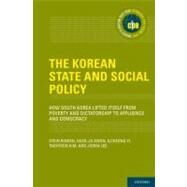The Korean State and Social Policy How South Korea Lifted Itself from Poverty and Dictatorship to Affluence and Democracy
, by Ringen, Stein; Kwon, Huck-ju; Yi, Ilcheong; Kim, Taekyoon; Lee, Jooha- ISBN: 9780199734351 | 0199734356
- Cover: Hardcover
- Copyright: 5/27/2011
There are two great mysteries in the political economy of South Korea. How could a destroyed country in next to no time become a sophisticated and affluent economy? And how could a ruthlessly authoritarian regime metamorphose with relative ease into a stable democratic polity? South Korea was long ruled with harsh authoritarianism, but, strangely, the authoritarian rulers made energetic use of social policy.The Korean State and Social Policyobserves South Korean public policy from 1945 to 2000 through the prism of social policy to examine how the rulers operated and worked. After the military coup in 1961, the new leaders used social policy to buy themselves legitimacy. That enabled them to rule in two very different ways simultaneously. In their determination to hold on to power they were without mercy, but in the use of power in governance, their strategy was to co-opt and mobilize with a sophistication that is wholly exceptional among authoritarian rulers. It is governance and not power that explains the Korean miracle. Mobilization is a strategy with consequences. South Korea was not only led to economic development but also, inadvertently perhaps, built up as a society rich in public and civil institutions. When authoritarianism collapsed under the force of nationwide uprisings in 1987, the institutions of a reasonably pluralistic social and political order were there, alive and well, and democracy could take over without further serious drama. This book is about many things: development and modernization, dictatorship and democracy, state capacity and governance, social protection and welfare states, and Korean history. But finally it is about lifting social policy analysis out of the ghetto of self-sufficiency it is often confined to and into the center ground of hard political science.






